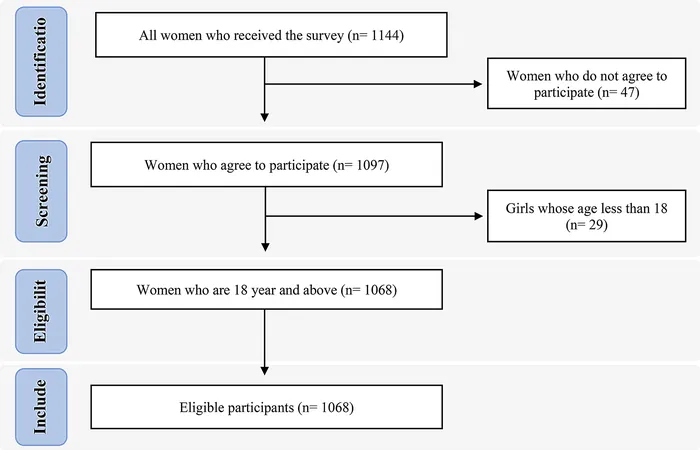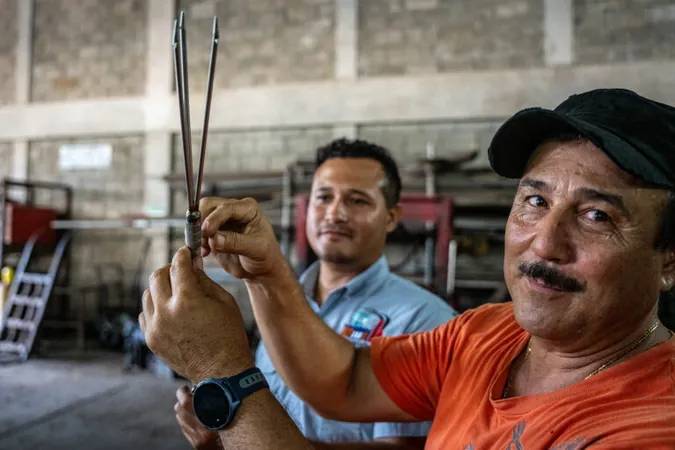
Unraveling the Mystery of Polycystic Ovary Syndrome: How Socioeconomic Factors and Lifestyle Choices Increase Risk Among Saudi Women
2024-11-23
Author: Nur
Unraveling the Mystery of Polycystic Ovary Syndrome: How Socioeconomic Factors and Lifestyle Choices Increase Risk Among Saudi Women
A recent comprehensive study conducted across Saudi Arabia has shed light on the crucial factors influencing the risk of Polycystic Ovary Syndrome (PCOS) among women. Involving a diverse sample from 13 administrative regions, this extensive research utilized a convenient sampling method that resonates with contemporary digital practices.
Data Collection and Ethical Considerations
The study, which received ethical clearance from an institutional review board, leveraged social media platforms like WhatsApp and Telegram to distribute questionnaires. This innovative approach aimed at ensuring a representative sample of adult women, aged 18 and older, while protecting their anonymity and ensuring informed consent.
Understanding PCOS: The Risk Factors
Participants provided important data regarding their demographic profiles, access to healthcare, lifestyle habits, health status, and perceived stress levels. The findings revealed a significant link between various sociodemographic factors and PCOS risk levels.
More strikingly, women were categorized into groups based on their self-reported risk of PCOS: low, suspected, high, and diagnosed. The study noted that an astonishing 22.5% of participants reported having a diagnosis of PCOS, showcasing the syndrome’s prevalence in the population.
Demographic Insights
The study highlighted that the majority of participants were young, with 57.2% under the age of 30. Additionally, 50.2% were single, and an impressive 72.4% held a bachelor's degree or higher. These insights indicate a correlation between educational attainment and the understanding of health risks.
Access to healthcare varied, with 33.5% of women covered by medical insurance. Interestingly, health behavior trends showed that despite a high percentage of non-smokers (93.4%), adherence to healthy diets was disappointingly low, with only 21.9% maintaining normal weight.
The Role of Stress and Lifestyle Choices
One of the most alarming findings was the connection between perceived stress and PCOS risk, particularly among younger women. The study utilized Cohen's Perceived Stress Scale, revealing an average score of 19.71 (± 6.68) among participants. Factors such as age, marital status, income, and smoking were all significantly tied to increased stress levels.
This correlation raises essential questions about the mental health landscape for women in Saudi Arabia, particularly those facing economic constraints or societal pressures.
Physical and Psychological Health Correlations
The prevalence of chronic health conditions among participants was concerning. Anxiety and depression were reported in 19% and 13% of the sample, respectively. Concurrently, cardiovascular and endocrine issues were the most common physical health complaints, showcasing the dual burden of conditions that could exacerbate PCOS.
Herbal Remedies vs. Conventional Treatments
Interestingly, a significant number of respondents (around 212 women) indicated a preference for herbal remedies over pharmaceutical interventions. This preference highlights a cultural inclination towards natural treatment methods, with popular choices including cumin, ginger, and chamomile.
Conclusion: A Call to Action
This study surfaces critical insights into the risk of PCOS among women in Saudi Arabia, emphasizing the need for targeted health campaigns to promote healthy lifestyles, raise awareness about PCOS, and address the mental health implications of chronic stress.
The extensive response rate (95.9%) and the thorough nature of the research underline the importance of understanding the multifaceted influences on women’s health. As healthcare providers and policy makers, the call to action is clear: implement strategies that combine education, mental health support, and lifestyle modification to mitigate the rising tide of PCOS in the community.
Stay Informed!
Don’t miss out on vital health updates! Follow our channel for ongoing insights into women’s health, empowerment, and wellness strategies.


 Brasil (PT)
Brasil (PT)
 Canada (EN)
Canada (EN)
 Chile (ES)
Chile (ES)
 España (ES)
España (ES)
 France (FR)
France (FR)
 Hong Kong (EN)
Hong Kong (EN)
 Italia (IT)
Italia (IT)
 日本 (JA)
日本 (JA)
 Magyarország (HU)
Magyarország (HU)
 Norge (NO)
Norge (NO)
 Polska (PL)
Polska (PL)
 Schweiz (DE)
Schweiz (DE)
 Singapore (EN)
Singapore (EN)
 Sverige (SV)
Sverige (SV)
 Suomi (FI)
Suomi (FI)
 Türkiye (TR)
Türkiye (TR)